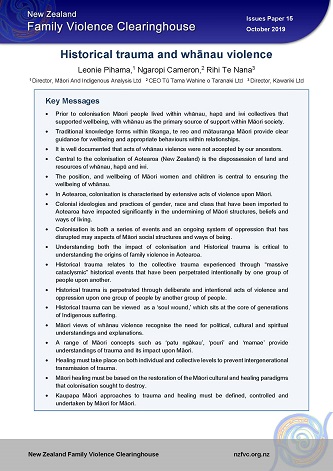
Issues Paper 15, October 2019
Authors: Leonie Pihama1, Ngaropi Cameron2 and Rihi Te Nana3
1 Director, Māori And Indigenous Analysis Ltd
2 CEO, Tū Tama Wahine o Taranaki Inc
3 Director, Kakariki Consulting Ltd
Downloads
Key Messages
- Prior to colonisation Māori people lived within whānau, hapū and iwi collectives that supported wellbeing, with whānau as the primary source of support within Māori society
- Traditional knowledge forms within tikanga, te reo and mātauranga Māori provide clear guidance for wellbeing and appropriate behaviours within relationships.
- It is well documented that acts of whānau violence were not accepted by our ancestors.
- Central to the colonisation of Aotearoa (New Zealand) is the dispossession of land and resources of whānau, hapū and iwi.
- The position, and wellbeing of Māori women and children is central to ensuring the wellbeing of whānau.
- In Aotearoa, colonisation is characterised by extensive acts of violence upon Māori.
- Colonial ideologies and practices of gender, race and class that have been imported to Aotearoa have impacted significantly in the undermining of Māori structures, beliefs and ways of living.
- Colonisation is both a series of events and an ongoing system of oppression that has disrupted may aspects of Māori social structures and ways of being.
- Understanding both the impact of colonisation and Historical trauma is critical to understanding the origins of family violence in Aotearoa.
- Historical trauma relates to the collective trauma experienced through “massive cataclysmic” historical events that have been perpetrated intentionally by one group of people upon another.
- Historical trauma is perpetrated through deliberate and intentional acts of violence and oppression upon one group of people by another group of people.
- Historical trauma can be viewed as a ‘soul wound,’ which sits at the core of generations of Indigenous suffering.
- Māori views of whānau violence recognise the need for political, cultural and spiritual understandings and explanations.
- A range of Māori concepts such as ‘patu ngākau’, ‘pouri’ and ‘mamae’ provide understandings of trauma and its impact upon Māori.
- Healing must take place on both individual and collective levels to prevent intergenerational transmission of trauma.
- Māori healing must be based on the restoration of the Māori cultural and healing paradigms that colonisation sought to destroy.
- Kaupapa Māori approaches to trauma and healing must be defined, controlled and undertaken by Māori for Māori.
Webinar
We also hosted author Professor Leonie Pihama to present a webinar on this topic on Thursday 31 October 2019.
Recommended citation
Pihama, L., Cameron, N., & Te Nana, R. (2019). Historical trauma and whānau violence. Issues Paper 15. Auckland, New Zealand: New Zealand Family Violence Clearinghouse, University of Auckland.
ISSN: 2253-3222, published online only.
Feedback
The Clearinghouse welcomes your feedback - please email us.


